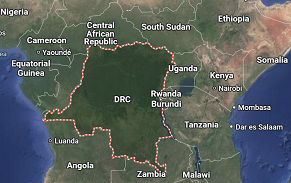The Executive Board of the International Monetary Fund (IMF) on Wednesday approved a 38-month arrangement for The Democratic Republic of the Congo under the Extended Credit Facility (ECF) in the amount of over $1.73 billion or 125 percent of quota.
The Fund also approved a 38-month arrangement under the Resilience and Sustainability Facility (RSF), in the amount of SDR799.5 million (about US$1,038 million or 75 percent of quota). “Economic activity remained strong in 2024, with real GDP growth projected at 6.0 percent. Inflation, which peaked at 23.8 percent at the end of 2023, decelerated to 12.8 percent in November 2024 and continued its decline in recent weeks,” the IMF said.
“The domestic fiscal balance is projected to have narrowed in 2024, as stronger-than-expected revenue mobilization was only partially absorbed by higher-than-anticipated wage bill and exceptional security expenditures. The current account deficit also is projected to have narrowed, thereby helping strengthen international reserves.”
The new ECF-supported program aims to build on the progress made under the 2021-2024 ECF program completed in July 2024, by preserving macroeconomic stability, improving the business climate, enhancing governance and transparency, and fostering inclusive growth, The ambitious endeavor entails among other things continued strong revenue mobilization efforts and deeper public financial management reforms, with a focus on enhancing efficiency and accountability in the use of public resources.
The RSF-supported program aims to help DRC realize its strategic vision as a “solution country” in the transition towards a low-carbon global economy, while strengthening its resilience to climate shocks.
At the conclusion of the Executive Board’s discussion, Mr. Okamura, Deputy Managing Director, and Chair stated:
“The economy of the Democratic Republic of the Congo (DRC) has remained resilient with robust economic growth, declining inflation and fiscal deficits despite the significant challenges it faces, including a recent pickup in decades-long armed conflicts in its eastern part and a public health crisis linked to the Mpox outbreak. These challenges have imposed heavy human and economic costs to the DRC. The outlook is positive, though subject to substantial downside risks, including from the above-mentioned conflicts.
“The authorities have made progress under the 2021 ECF, thereby helping achieve a stronger-than-expected economic growth and a build-up of foreign exchange reserves. However, macroeconomic policy, structural and climate-related challenges remain and require deeper reforms.
“Under the new ECF arrangement, the authorities plan to boost growth and create fiscal space for priority investment and social spendings. This would be achieved by strengthening domestic revenue mobilization and stepping up fiscal discipline, including through a stricter adherence to normal expenditure chain procedures, the operationalization of the Directorate-General of the Treasury and Public Accounting, the decentralization of payment authorization, and the setting up a Treasury Single Account. A gradual transition toward a resource-based fiscal framework, to insulate the budget from volatile mining revenues, and to curb procyclicality of spending would be important. The authorities also aim to improve the business climate, governance, and transparency, and more decisively tackle corruption.
“The Central Bank of the Congo (BCC) has appropriately maintained a tight monetary policy stance to combat inflation, which has consequently declined substantially in 2024. The authorities aim to continue efforts to accumulate international reserves, strengthen the monetary policy implementation framework and the foreign exchange intervention strategy, to help enhance the transmission of monetary policy and alleviate pressures in the foreign exchange market.
“The new RSF arrangement will provide the necessary support to navigate the ongoing challenges and advance the country’s climate adaptation and mitigation agenda while consolidating its role as a “solution country” in the transition to a low-carbon global economy. In particular, the RSF-supported program will focus on protecting the DRC’s significant rainforest, building resilience to climate disasters, and better integrating climate considerations into public investment management.”

